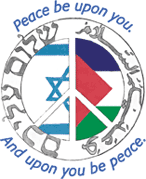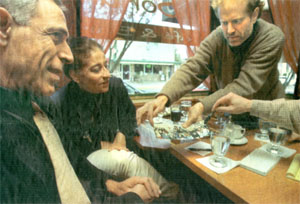

Finding room for friendship
Jews and Arabs in Eugene seek a route to peace in their homeland
By JEFF WRIGHTThe Register-Guard
04/16/2001
RESTAURATEUR IBRAHIM HAMIDE was baking bread last week when friend Avishai Pearlson stopped by to say hello - and to introduce Hamide to his parents.
Before long, Hamide learned that Pearlson's parents also operate a restaurant - at their kibbutz in Israel. Pearlson's father and two of his nieces couldn't resist giving Hamide a hand in the kitchen.
"We were literally making bread together," Hamide said.
Communion between Palestinian and Jew can seem rare these days - at least when seen against the backdrop of the Middle East, where every day seems to bring new headlines of violence.
But halfway around the world in Eugene, Arabs and Jews gather each month to share their stories, their pain and their determination to defy the stereotype that says they must be enemies.
The Middle East Peace Group attracts as many as 50 people to its potluck meetings - not bad for a group that formed only six months ago when an Israeli Jew reached out to a Muslim from Saudi Arabia.
The Jew is Alon Raab, a professor of Hebrew in the University of Oregon's 3-year-old Judaic studies program and a longtime peace and environmental activist. Raab visited family members in Jerusalem in September - just weeks before Israeli security forces and Palestinian residents clashed throughout the Israeli-occupied West Bank and Gaza Strip.
The fighting erupted after Ariel Sharon, a hawkish Israeli politician who has since been elected prime minister, visited the Temple Mount in Jerusalem, a shrine considered sacred by both Muslims and Jews. Nearly 70 people died and more than 1,800 were injured in that first week, and sporadic violence has continued ever since.
On his trip, Raab crossed the border into Jordan. He said he was struck by the friendliness of Palestinian store owners, army guards and postal clerks. The violence that erupted shortly after his departure left him feeling deeply frustrated, sad and angry, he said.
 Ibrahim Hamide (left), Nadia Sindi and Avishai Pearlson share pictures at a recent gathrering of the Middle East Peace Group.
Ibrahim Hamide (left), Nadia Sindi and Avishai Pearlson share pictures at a recent gathrering of the Middle East Peace Group. Photo by CHRIS PIETSCH / The Register Guard
But what?
The answer came when he got ready to teach a class in the university's language lab - and had to wait a few minutes for Arabic language instructor Nadia Sindi to leave the lab. Raab knew Sindi only casually - they had both lectured at a UO conference on the Middle East two years earlier - and didn't want to rush her unduly.
"We don't want to upset the Arabs," he said, jokingly, to a bystander. Sindi, a Muslim who grew up in Saudi Arabia, overheard the comment - and the two began to chat. Sindi said Raab seemed sad to her; he shared his feelings about the unrest in the Middle East - and asked Sindi what she thought about his idea of getting local Arabs and Jews together.
"I told him I thought it was great," Sindi recalled. Arabs and Jews "have been having these fights since I was a little girl, and I have had enough of all this screaming and fighting. I just want some peace."
They each called some friends - and an initial meeting attracted about six people. But with little more than word of mouth, the group's numbers have multiplied eightfold.
The meetings are centered on eating, socializing - and giving everyone a chance to talk about their fears and hopes for the Middle East.
"It's fear that makes us enemies," Sindi said. "When we share our stories about our fears, we heal. We need to know each other's pain, each other's stories, in order to connect."
Sindi said she still remembers the first time, as a teen-ager new to Eugene, that she encountered a Jewish man in a restaurant. Her instinct was to recoil: "I freaked out! I thought he was going to kill me!" she said.
In the peace group, she made friends with Pearlson and marveled to hear his expressions of fear.
"History says that the Jews always win the wars, and we only have stones - so how can they be afraid of us?" Sindi said. "This was an epiphany - a Kodak moment! - to understand that they have feelings and fears just like us!"
Pearlson, a massage therapist, served in the Israeli army and said he grew up in a kibbutz next to an Arab village. The neighbors always got along, and yet he would often dream of Palestinian youths "running down the road with sticks and stones," he said.
Pearlson said he now realizes he was "brainwashed" while growing up to believe that "we are surrounded by enemies and if we are weak we'll be washed into the sea."
Hamide, the restaurant owner, said he appreciates the group because he's not expected to check his personal opinions at the door. Members often "spew like a volcano, but that's because it's such an emotional subject," he said.
In addition to their monthly meetings, members often meet just two or three at a time for coffee and conversation. But several members point to a larger celebration in December that bound the group together.
The event fell on the winter solstice - a day that also marked the first day of the Jewish holiday of Hanukkah and one of the last days of Ramadan, an important Muslim time of fasting.
The celebrants lit the Jewish menorah, heard Muslims tell the meaning of Ramadan, and listened to a woman sing a song of peace - in English, Arabic and Hebrew.
"If they had miracles back then (in ancient times), we thought, `Let's have a miracle right now!' ' said Pearlson about the gathering.
More recently, Pearlson left to visit family in Israel - but not before members "passed the hat" and gave him $74 to give to whomever he wished on his trip. Pearlson said he gave the money to an Israeli Jew who provides food and supplies to West Bank refugees.
On the same trip, Pearlson visited the brother and mother of Nazir Zahra,an Israeli Arab who belongs to the local group. Pearlson said Zahra's brother lives in Haifa in a large house shared by two Jewish families, two Christian families and a Muslim family, among others.
The group members say they're idealistic, but not naive. Several say they fear Israel's conservative government and what it may portend for further bloodshed.
But members say they also believe that what they're doing is important - no matter how "pie in the sky" it may appear to others.
"We're doing something that all the politicians could not accomplish," Hamide said. "And if one person can do it, a million people can do it."
Reprinted with permission from the Eugene Register Guard
Copyright © 2001 The Register-Guard
Home | Mission Statement | Articles | Events | Let Your Voice Be Heard
Links ~ Learn More | Contact Us
Eugene Middle East Peace Group
P.O. Box 11313, Eugene OR 97440
email: emepg@mideastpeace.net